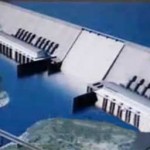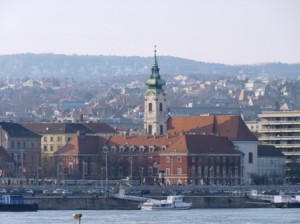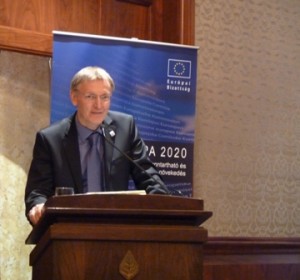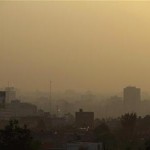Ethiopia’s Hydropower Plant
 Ethiopia is building the biggest hydropower plant in Africa. It will be called the "Grand Millennium Dam" and it'll be constructed right on the Nile river, about 40 kilometers from the Sudanese border. Ethiopian Prime Minister Meles Zenawi has already laid down the cornerstone on the dam.
Ethiopia is building the biggest hydropower plant in Africa. It will be called the "Grand Millennium Dam" and it'll be constructed right on the Nile river, about 40 kilometers from the Sudanese border. Ethiopian Prime Minister Meles Zenawi has already laid down the cornerstone on the dam.
The Grand Millennium Dam, which will cost about $4.8 billion US dollars, is expected to generate 5,250 megawatts of energy and be completed in just four years. Just to give you a little perspective, Ethiopia's new hydropower plant will have the ability to generate twice as much energy as Hoover Dam in the U.S. Ethiopia has a lot of potential when it comes to hydropower, and officials there want to tap into that opportunity. Plus the plant will provide jobs and an economic boost to the country.
Is hydropower underutilized in your country? Tell us about the hydropower projects in your area!
Climate Change Victims
Some new research from the National Center for Atmospheric Research (NCAR) in the U.S. confirms what we've been hearing from environmentalists for years: the world's developing cities will be the ones hardest hit by the effects of climate change. According to the analysis, which will be published in a journal called "Current Opinion in Environmental Sustainability," even though these cities face a high risk of serious climate change consequences, they've done little to address the problem and try to protect residents.
Cities themselves can set green-friendly targets, like lowering CO2 emissions or choosing renewable energy projects. But developing metropolises have been slow to take those kinds of steps. So some of those negative effects of climate change that we've seen in recent years–like severe weather and natural disasters–could end up wreaking havoc in these teeming, booming hubs–which are often overcrowded, too.
Do you live in a developing city, or near one? What could your city do to protect its people from the dangers of climate change?
Wind energy – the soft power
Among renewable energies wind power is number one. Wind energy facilities are cheaper to set up and maintain, require less infrastructure and generate greater returns in the long run. Wind power has become a booming global industry with new and ever larger wind farms springing up everywhere. Large scale facilities in particular are supposed to be crucial for a global switch to renewables. Over the last three years alone the number of wind turbines across the world has more than doubled. The GLOBAL IDEAS reporters have visited China, India, Morocco and Germany to investigate the promises ? and challenges ? of wind power.
Earth Hour 2011
Yesterday was Earth Hour 2011–did you take part? Or watch the lights turn out in your city? Earth Hour was started by World Wildlife Fund, or WWF, in 2007, and now it takes place every year on the last Saturday in March. For one hour across the globe, homes and businesses switch off their lights and electrical appliances to send a message about climate change.
The participation has grown year after year: in 2010, 126 countries took part, compared to 96 the year before. It's always an impressive site to see major cities like Sydney, New York, Paris and Berlin power down for an hour–the Russia Today video above gives you an idea of what it looks like. But every household and every person who takes part is also making a major contribution.
Do you have pictures from Earth Hour 2011? Post them on our GLOBAL IDEAS Facebook site!
On the banks of the blue Danube
 I took a good look at the river Danube in the centre of Budapest in my lunch-break today and in the sunshine on a pleasantly warm spring day, I could just about imagine it was blue like in the famous Strauss waltz. But like most major rivers these days, it is more brown than blue. And the sound all around is of traffic rather than music. The river is wide, flanked by beautiful historic buildings and host to a fleet of tourist boats.
I took a good look at the river Danube in the centre of Budapest in my lunch-break today and in the sunshine on a pleasantly warm spring day, I could just about imagine it was blue like in the famous Strauss waltz. But like most major rivers these days, it is more brown than blue. And the sound all around is of traffic rather than music. The river is wide, flanked by beautiful historic buildings and host to a fleet of tourist boats.
What an apt place for a conference on the “Future of European Waters”. It’s taking place within the framework of the Hungarian Presidency of the EU and I’m here with a group of journalists from different member countries on the invitation of the European Journalism Centre. Water is an “in” topic at the moment. At a high-level meeting here this weekend, the EU Environment Commissioner Janez Potocnik is presenting a “blueprint” for the future of water in the Community.
 Ultimately it’s all about how we treat water as a resource. The Commissioner and the scientists and experts speaking at the conference stress that water as a key resource can never be considered in isolation. We need it to drink, wash, grow crops, for industry, transport, to provide power and, as the disaster in Japan keeps reminding us, to cool nuclear reactors. So all different sectors have to be involved in making sure we have a secure water supply in the future, and that means quality as well as quantity. Demands on water, which is a scarce resource in many places, are rising all the time. And a river like the Danube flows through several different countries, so protecting it cannot just be a national issue. That’s when it becomes clear that Europe has an essential role to play.
Ultimately it’s all about how we treat water as a resource. The Commissioner and the scientists and experts speaking at the conference stress that water as a key resource can never be considered in isolation. We need it to drink, wash, grow crops, for industry, transport, to provide power and, as the disaster in Japan keeps reminding us, to cool nuclear reactors. So all different sectors have to be involved in making sure we have a secure water supply in the future, and that means quality as well as quantity. Demands on water, which is a scarce resource in many places, are rising all the time. And a river like the Danube flows through several different countries, so protecting it cannot just be a national issue. That’s when it becomes clear that Europe has an essential role to play.
Jacqueline McGlade is the Executive Director of the European Environment Agency. She told me here that water had to be the next big topic on the European Agenda, following on from energy and climate change. She mentioned the worrying increase in floods and droughts in Europe. All the climate experts tell us we have to prepare for more extreme weather events. Managing our water resources in a changing climate is becoming an existential issue. When it comes to what it means in practice, the buzzwords seem to be efficiency, technology and recycling. A country like Singapore has developed an effective and complex system to recycle and re-use its water.
The other key issue is coordination and involving all the necessary parties who have a need for or an impact on our water. It makes sense that protecting water is only possible by involving agriculture and industry both as users of water and sources of water pollution, and every sector that needs water. Europe’s water infrastructure – from drinking water to sewage processing – is getting old, a lot of needs to be replaced with more modern technology – but that’s a costly business. Plenty of things to talk about – and, we hope, act upon – for the politicians and experts here on the “blue Danube” this weekend.









Feedback